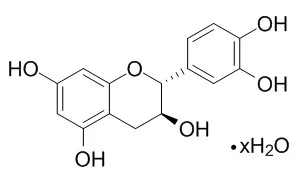| In vivo: |
| Indian J Exp Biol. 2013 Oct;51(10):823-7. | | Effect of (+)-catechin hydrate on oxidative stress induced by high sucrose and high fat diet in male Wistar rats.[Pubmed: 24266106] |
METHODS AND RESULTS:
Increased lipid peroxidation and reduced glutathione levels in liver of rats fed high sucrose high fat (HSHF) diet were normalized by concomitant administration of (+)-Catechin hydrate. Plasma non-enzymatic antioxidants viz. alpha-tocopherol, ascorbic acid and total thiols decrease were also significantly less in rats administered with (+)-Catechin hydrate concomitantly with HSHF diet. Thus the present results indicate that (+)-Catechin hydrate has antioxidant activity and is effective in reducing oxidative stress.
CONCLUSIONS:
The study is of clinical importance as oxidative stress is known to be the cause of many clinical manifestations viz. cancer, Parkinson's disease, atherosclerosis, heart failure, myocardial infarction and many other diseases. | | Cytotechnology . 2018 Feb;70(1):245-259. | | Catechin ameliorates doxorubicin-induced neuronal cytotoxicity in in vitro and episodic memory deficit in in vivo in Wistar rats[Pubmed: 28900743] | | Abstract
Cognitive dysfunction by chemotherapy compromises the quality of life in cancer patients. Tea polyphenols are known chemopreventive agents. The present study was designed to evaluate the neuroprotective potential of (+) catechin hydrate (catechin), a tea polyphenol, in IMR-32 neuroblastoma cells in vitro and alleviation of episodic memory deficit in Wistar rats in vivo against a widely used chemotherapeutic agent, Doxorubicin (DOX). In vitro, neuroprotective studies were assessed in undifferentiated IMR-32 cells using percentage viability and in differentiated cells by neurite length. These studies showed catechin increased percentage viability of undifferentiated IMR-32 cells. Catechin pretreatment also showed an increase in neurite length of differentiated cells. In vivo neuroprotection of catechin was evaluated using novel object recognition task in time-induced memory deficit model at 50, 100 and 200 mg/kg dose and DOX-induced memory deficit models at 100 mg/kg dose. The latter model was developed by injection of DOX (2.5 mg/kg, i.p.) in 10 cycles over 50 days in Wistar rats. Catechin showed a significant reversal of time-induced memory deficit in a dose-dependent manner and prevention of DOX-induced memory deficit at 100 mg/kg. In addition, catechin treatment showed a significant decrease in oxidative stress, acetylcholine esterase and neuroinflammation in the hippocampus and cerebral cortex in DOX-induced toxicity model. Hence, catechin may be a potential adjuvant therapy for the amelioration of DOX-induced cognitive impairment which may improve the quality of life of cancer survivors. This improvement might be due to the elevation of antioxidant defense, prevention of neuroinflammation and inhibition of acetylcholine esterase enzyme.
Keywords: (+) Catechin hydrate; Chemobrain; Doxorubicin; Episodic memory; IMR-32 cells; Neuroprotection. |
|






 Cell. 2018 Jan 11;172(1-2):249-261.e12. doi: 10.1016/j.cell.2017.12.019.IF=36.216(2019)
Cell. 2018 Jan 11;172(1-2):249-261.e12. doi: 10.1016/j.cell.2017.12.019.IF=36.216(2019) Cell Metab. 2020 Mar 3;31(3):534-548.e5. doi: 10.1016/j.cmet.2020.01.002.IF=22.415(2019)
Cell Metab. 2020 Mar 3;31(3):534-548.e5. doi: 10.1016/j.cmet.2020.01.002.IF=22.415(2019) Mol Cell. 2017 Nov 16;68(4):673-685.e6. doi: 10.1016/j.molcel.2017.10.022.IF=14.548(2019)
Mol Cell. 2017 Nov 16;68(4):673-685.e6. doi: 10.1016/j.molcel.2017.10.022.IF=14.548(2019)